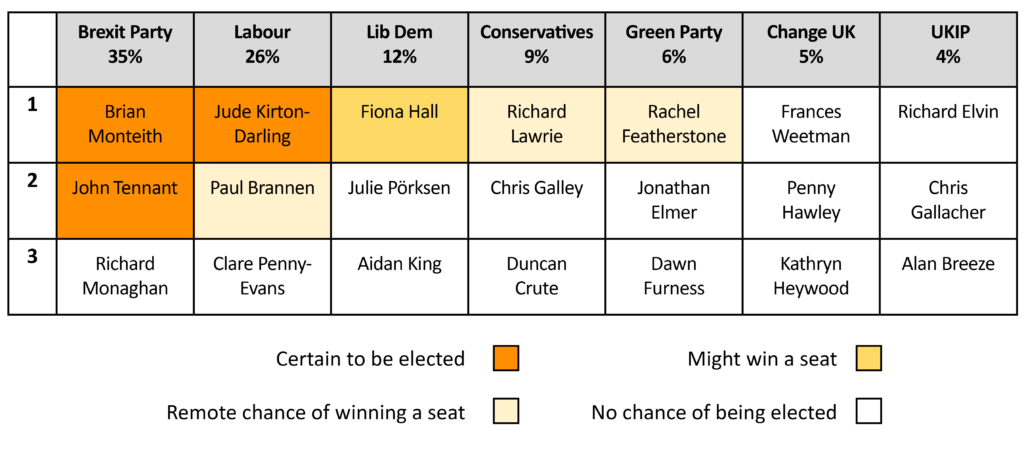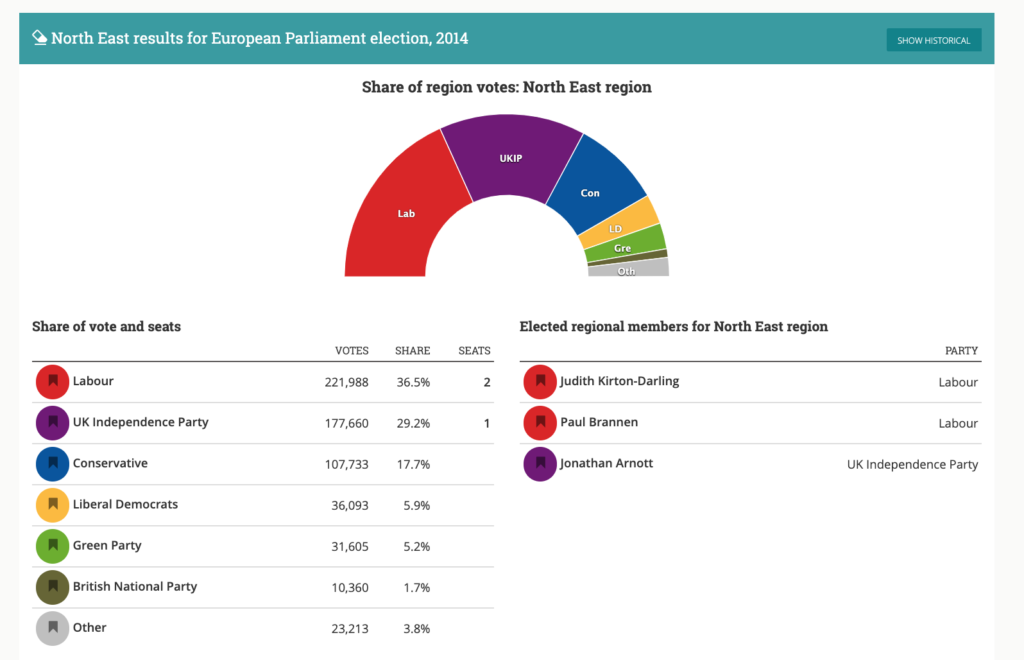European elections 2019: what will happen in England’s North East region?
Although the European Parliament elections are proportional ones, in a small region of three seats like the North East only the top two or three parties can hope to win a single seat, and only a strong party (with more than 30% support) can hope to win two. So this will likely be the least proportional region in the upcoming European Parliament elections, which take place on 23 May – and one of those where tactical voting is most useful. With voters able to cast only a single vote for a party list, the Democratic Audit team reviews likely outcomes for the parties and the main potentially electable candidates.

Angel of the North. Gateshead. Photo by Boris YUE on Unsplash
Note: This article was first published on 16 May and updated on 20 May to take into account the latest regional polling data.
The North East has traditionally been strong Labour territory. Last time these elections took place in 2014, Labour won two seats here (squeezing out the Conservatives on 18%; see Figure 2 at the bottom of this article for the full 2014 results). UKIP ran a strong second and secured an MEP, but as has happened nationally this legacy has transferred to the Brexit Party. In the 2016 EU referendum, this region voted by 58% to 42% to leave, above the national average.
Figure 1 shows that the latest YouGov poll puts the Brexit Party strongly in the lead on 35% to Labour’s 26%, guaranteeing both parties a seat. This marks an increase in the Brexit Party’s fortunes in recent weeks (ComRes polling from 1–7 May had Labour and the Brexit Party neck and neck on 31% and 29% respectively). The Brexit Party’s surge in support seems to be continuing and firming up, and on this basis they will win two seats.
Labour is guaranteed a seat but has no up-momentum, so cannot hope for more than that. By contrast, in recent weeks, the Liberal Democrats have moved from sixth place (in the ComRes poll) to third on 12%. This is still well short of what is required to win one of the three seats (about 17–19%), but it clearly makes them the strongest of the clear-Remain parties here. Their experienced candidate, Fiona Hall, won the third seat here in in 2004 and 2009. On this basis they have a small chance of gaining a seat, but only if they can attract many more strongly pro-Remain voters from Labour, the Greens and Change UK.
Because there are so few seats available here, smaller parties have little chance. The Greens have slipped to 6% in the YouGov poll (from 11% in an earlier poll by ComRes). The Change UK party also come up well short on 5%. UKIP still has 4% support, but is running last in recent polls.
Figure 1 below sums up the latest polling evidence and suggests three likely clear winning candidates, two for the Brexit Party and one for Labour. The Liberal Democrats perhaps have an outside chance of able to stop the Brexit party getting a second seat. Each party nominates three candidates for the region, which we show below. Voters can only vote for a single party list, not specific candidates, by marking a single X on the ballot paper. In making up their minds which party list to support, voters need only pay attention to the seven candidates in the shaded boxes here.
Figure 1: Main party candidates in the North East region (with YouGov poll data, 8–17 May 2019) and possible winners

YouGov poll, 8–17 May, weighted by likelihood to vote, excluding those who would not vote, don’t know or refused.
To find details of all the local candidates, and to locate your polling station, visit our Democratic Dashboard and enter your postcode. The site also has full details of other recent elections in your local area.
Below we give summary details of any candidate in Figure 1 with some chance of being elected, and points you to their Twitter account (where they have one), so you can find out something of what they are like as a person. Below that we also show the full 2014 results for the North East.
Which candidates could be elected in the North East?
THE BREXIT PARTY – Brian Monteith is certain to win, and the party’s current poll surge suggest that John Tennant will as well.
- Brian Monteith (Twitter: @TheBluetrot). Monteith was previously a member of the Conservative party, and Member of the Scottish Parliament from 1999 to 2007. He works in policy and political communications and is a regular columnist for The Scotsman. Read why he is standing for the Brexit Party here.
- John Tennant (Twitter: @CllrTennant). A former UKIP councillor, Tennant now sits as an independent councillor on Hartlepool council.
LABOUR – Both the sitting Labour MEPs are standing again. Jude Kirton-Darling looks certain of re-election, but it seems unlikely that Labour can win two seats again.
- Jude Kirton-Darling (Twitter: @Jude_KD; for her European Parliament voting record, see her Votewatch.eu profile here). Kirton-Darling was elected as an MEP in 2014, and sits on international trade and petitions committees there. Before her election she was the Confederal Secretary of the European Trade Union Congress.
- Paul Brannen (Twitter: @PaulBrannenNE; Votewatch.eu profile). Elected as an MEP in 2014, Brennen was previously the Labour candidate for the parliamentary seats of Hexham and Berwick-upon-Tweed, and a former Newcastle City councillor. He sits on committees for rural development and the environment, public health and food safety.
LIBERAL DEMOCRATS – Their top candidate served a decade as an MEP for the region until 2014, and the party has come a clear third in recent polls here. However, a strong pro-Remain surge would be needed to stop the Brexit Party winning a second seat.
- Fiona Hall (Twitter: @FionaHallEU). Hall was a Lib Dem MEP for the North East between 2004 and 2014 (when she stood down), and was previously leader of the Lib Dems in the European Parliament.
CONSERVATIVES – Their top candidate seems out of the running, given the party’s slump in support, but might do better on the day.
- Richard Lawrie. Lawrie is a Former Conservative Prospective Parliamentary Candidate for City of Durham constituency, and a university lecturer.
THE GREEN PARTY – It seems as if the party’s top candidate cannot win, as the Lib Dems pull away as the strongest pro-Remain party.
- Rachel Featherstone (Twitter: @RachelFeather10). Featherstone was previously a Green Party candidate for Sunderland council.
CHANGE UK – Their top candidate has local credentials but the party has not made an impression.
- Frances Weetman (Twitter: @francesweetman). A writer, economist and former Labour councillor who quit the party over anti-semitism, Weetman now sits as an independent councillor in Tynemouth.
UKIP – With the Brexit Party blitzing UKIP’s support nationally, it would be surprising if even their top candidate stands any chance here.
- Richard Elvin (Twitter: @globalrichard). Long-standing UKIP supporter and frequent candidate in local and Westminster elections, including standing in Sunderland in the 2019 local elections. See here for more details.
Figure 2: 2014 European Parliament Election results for the North East

Source: Democratic Dashboard. Note, order elected: 1. Jude Kirton-Darling (Labour); 2 Jonathan Arnott (UKIP); 3 Paul Brannen (Labour)
Read more about how the European Parliament elections work:





 Democratic Audit's core funding is provided by the Joseph Rowntree Charitable Trust. Additional funding is provided by the London School of Economics.
Democratic Audit's core funding is provided by the Joseph Rowntree Charitable Trust. Additional funding is provided by the London School of Economics.
[…] 'undefined')jQuery('div.switcher div.selected a').html(lang_html.replace('data-gt-lazy-', ''));}}); European elections 2019: what will happen in England’s North East region? Democratic Audit […]
“All the parties have cluttered up the ballot paper with candidates who cannot possibly win a seat under proportional representation”
While it’s true that these people can’t win on election day, there aren’t any by-elections for the European Parliament – if any MEP resigns (or dies), then they are replaced by the next name on the party list.
Because they don’t create the inconvenience of a by-election (and the risk of loss), MEPs are much more likely to resign than MPs are, so these later candidates are surprisingly likely to actually become MEPs – especially if their party does get multiple MEPs in a region.
“On this basis they have no chance of gaining a seat in the North East, and may only help split the Remain voters further. ”
The point about PR is that we all get equal representation. Therefore we need a range of candidates to choose from. This D’Hondt system in a region of only three possible representatives just doesn’t deliver PR.
PR means you don’t have to vote tactically or worry about splitting the Remain votes.